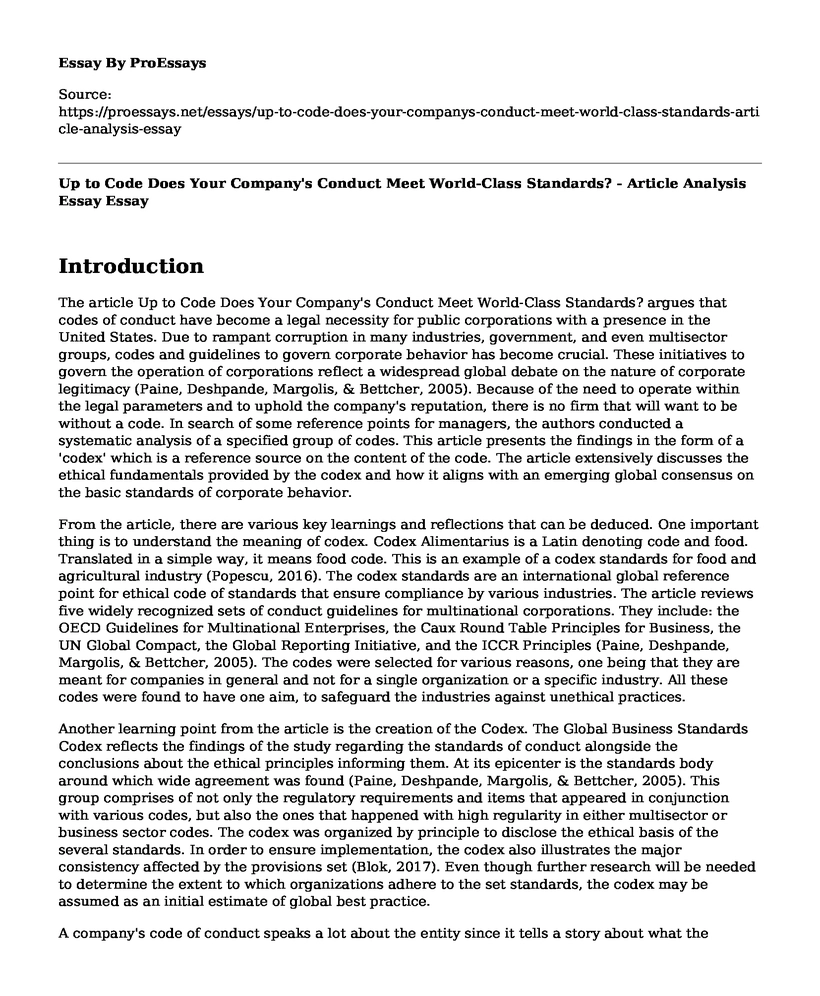Introduction
The article Up to Code Does Your Company's Conduct Meet World-Class Standards? argues that codes of conduct have become a legal necessity for public corporations with a presence in the United States. Due to rampant corruption in many industries, government, and even multisector groups, codes and guidelines to govern corporate behavior has become crucial. These initiatives to govern the operation of corporations reflect a widespread global debate on the nature of corporate legitimacy (Paine, Deshpande, Margolis, & Bettcher, 2005). Because of the need to operate within the legal parameters and to uphold the company's reputation, there is no firm that will want to be without a code. In search of some reference points for managers, the authors conducted a systematic analysis of a specified group of codes. This article presents the findings in the form of a 'codex' which is a reference source on the content of the code. The article extensively discusses the ethical fundamentals provided by the codex and how it aligns with an emerging global consensus on the basic standards of corporate behavior.
From the article, there are various key learnings and reflections that can be deduced. One important thing is to understand the meaning of codex. Codex Alimentarius is a Latin denoting code and food. Translated in a simple way, it means food code. This is an example of a codex standards for food and agricultural industry (Popescu, 2016). The codex standards are an international global reference point for ethical code of standards that ensure compliance by various industries. The article reviews five widely recognized sets of conduct guidelines for multinational corporations. They include: the OECD Guidelines for Multinational Enterprises, the Caux Round Table Principles for Business, the UN Global Compact, the Global Reporting Initiative, and the ICCR Principles (Paine, Deshpande, Margolis, & Bettcher, 2005). The codes were selected for various reasons, one being that they are meant for companies in general and not for a single organization or a specific industry. All these codes were found to have one aim, to safeguard the industries against unethical practices.
Another learning point from the article is the creation of the Codex. The Global Business Standards Codex reflects the findings of the study regarding the standards of conduct alongside the conclusions about the ethical principles informing them. At its epicenter is the standards body around which wide agreement was found (Paine, Deshpande, Margolis, & Bettcher, 2005). This group comprises of not only the regulatory requirements and items that appeared in conjunction with various codes, but also the ones that happened with high regularity in either multisector or business sector codes. The codex was organized by principle to disclose the ethical basis of the several standards. In order to ensure implementation, the codex also illustrates the major consistency affected by the provisions set (Blok, 2017). Even though further research will be needed to determine the extent to which organizations adhere to the set standards, the codex may be assumed as an initial estimate of global best practice.
A company's code of conduct speaks a lot about the entity since it tells a story about what the company prides in and what it cares about, what it is truly committed to and the way it is expected to operate. From my experience, a good industry should always pay close attention to the code of conduct since the best codes, be it global or local codes, serves as the strategic communication that excellently depicts an organization's commitment to act responsibly within the industry standards and to accept accountability in doing so. Therefore, maintaining and adhering to codes of conduct is crucial for the success of any industry operating either locally or globally.
References
Blok, V. (2017). Bridging the gap between individual and corporate responsible behaviour: Toward a performative concept of corporate codes. Philosophy of Management, 16(2), 117-136.
Paine, L., Deshpande, R., Margolis, J. D., & Bettcher, K. E. (2005). Up to code: Does your company's conduct meet world-class standards? Harvard Business Review, 83(12), 122-33.
Popescu, A. (2016). In Brief: Pros and Cons of Corporate Codes of Conduct. Journal of Public Administration, Finance and Law, (09), 125-130.i
Cite this page
Up to Code Does Your Company's Conduct Meet World-Class Standards? - Article Analysis Essay. (2023, Mar 30). Retrieved from https://proessays.net/essays/up-to-code-does-your-companys-conduct-meet-world-class-standards-article-analysis-essay
If you are the original author of this essay and no longer wish to have it published on the ProEssays website, please click below to request its removal:
- Marketing Philosophy of Amazon Paper Example
- Research Paper on Educating Entrepreneurs
- Essay Sample on Apple Inc.'s Innovative Culture: Achieving Industry Leadership
- Amazon's Remarkable Rise: From Books to Alexa - Essay Sample
- Essay on Advancing Human Service Delivery: Improving Accessibility, Responsibility, and Coordination
- Research Paper Example on Organizational Structure: Key to Achieving Competitive Advantage
- Free Report Sample on Guy Savoy: A World-Class Restaurant Experience in Paris & Las Vegas







